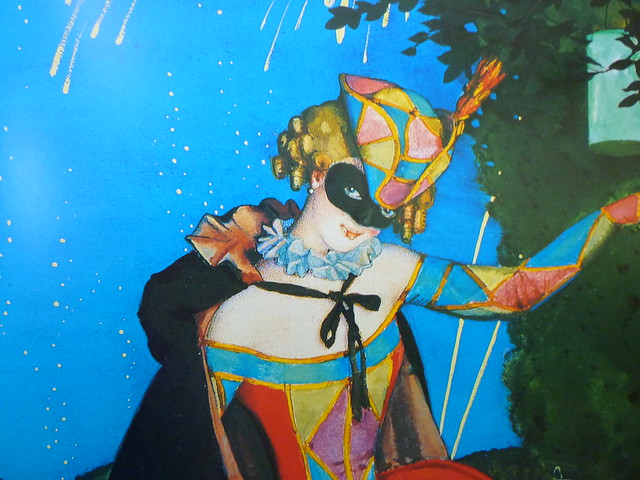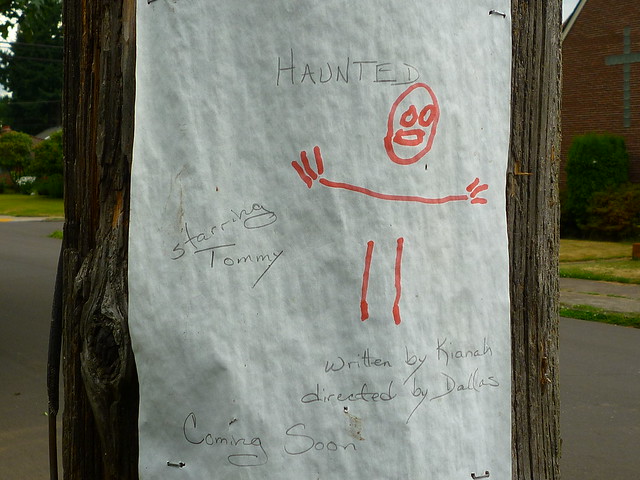Image Slider
Home / Archive for 2011
Happy New Year!
Posted by
Jen
|
On
Saturday, December 31, 2011
better hurry
Posted by
Jen
|
On
Friday, December 30, 2011
I know we're already on to the next holiday, but how was your Christmas if you celebrate Christmas? I got a pitchfork!!!! (don't you love how it was fiendishly disguised in wrapping paper?) Technically it's a spading fork, but pitchfork is a much more pleasing word.
I'm using it mainly for turning compost, which I started making this summer. I've been meaning to compost forever (of course), but for some reason I could never get it together. I'm not sure how together I have it now, but it's been working! I'm making FREE DIRT! Woo hoo! (Look, I know it may not sound exciting, but if you've ever paid a lot of money for expensive fancy compost/dirt, you know what I mean.) I was always intimidated by... I'm not sure what. The alchemy of old lettuce and egg shells turning into something valuable? Probably.
Mike McGrath's Book of Compost is the book referred to the most. I knew the basic gist of composting (green stuff and brown leaves in the proper proportions), but I could never work out the particulars. I saw this book pass through at work and put a copy on hold for myself - I definitely recommend it to anyone who is interested in composting. There are some goofy illustrations, but the information is totally sound.
PITCHFORK!
hey hey in the hayloft
Posted by
Jen
|
On
Tuesday, December 20, 2011
Today I watched Sullivan's Travels again and it was delightful as always. I forget how funny these screwball era movies are if I haven't seen one in a while. Sullivan's Travels was on my mind because I pressed it on a co-worker who hadn't seen it in years - she took it on holiday for thanksgiving and her whole family loved it. It's not a classic just because it was funny back in 1942, but because it's TIMELESS.
One of my favorite bits from early in the movie is director Sullivan - known for his light comedies - trying to convince two studio bosses to let him make O Brother Where Art Thou, his movie vision that's "a true canvas of the suffering of humanity." I love the bosses trying to bargain for "a little sex in it" and I really love the titles of his early films: Hey Hey in the Hayloft; So long, Sarong; Ants in Your Plants of 1939. (ANTS IN YOUR PLANTS OF 1939!!!!) Ha ha ha! These titles are perfect parodies of a certain kind of movie (Gold Diggers of 1933/1935/1937, anyone?) but I would happily watch any one of them if they really existed.
But my luck is even better, because I have the rest of the Preston Sturges box set waiting by the television. (I think maybe Palm Beach Story next - that one has Joel McCrae and Claudette Colbert and, of course, hilarious misunderstandings.)
Or maybe I should watch this one again and follow it up with the Coen brothers O Brother Where Art Thou...
One of my favorite bits from early in the movie is director Sullivan - known for his light comedies - trying to convince two studio bosses to let him make O Brother Where Art Thou, his movie vision that's "a true canvas of the suffering of humanity." I love the bosses trying to bargain for "a little sex in it" and I really love the titles of his early films: Hey Hey in the Hayloft; So long, Sarong; Ants in Your Plants of 1939. (ANTS IN YOUR PLANTS OF 1939!!!!) Ha ha ha! These titles are perfect parodies of a certain kind of movie (Gold Diggers of 1933/1935/1937, anyone?) but I would happily watch any one of them if they really existed.
But my luck is even better, because I have the rest of the Preston Sturges box set waiting by the television. (I think maybe Palm Beach Story next - that one has Joel McCrae and Claudette Colbert and, of course, hilarious misunderstandings.)
Or maybe I should watch this one again and follow it up with the Coen brothers O Brother Where Art Thou...
wintertime
Posted by
Jen
|
On
Tuesday, December 20, 2011

How is your mid-late December going? I've reached the point where I am longing for January, which means I need a MENTAL CORRECTION. (not like brain jail, more like a 'check yourself before you wreck yourself' intervention.) Let's say more of a recalibration than a correction - it sounds nicer, but more mechanical. hmmm...
Anyway! I like this Christmas lights picture. They look like little neon skiffs sailing to the north pole.

More lights - this time with needlework.
I usually think of January 1 new year's resolutions as a self-defeating high-pressure cop out. If you want to make the change (whatever it may be) why not start now? Except this year I find myself feeling a lot of pressure to get this or that holiday thing done, and that I can either be thinking about how I have to do these things, or I can be doing these things, but I sure as shit shouldn't be thinking about how I want to take more photographs in the new year, let alone be taking more photographs RIGHT NOW. But this is bullshit! I could get all this holiday stuff (most of which is FUN) done in no time. It's a complicated time of year. I'm scraping the barrel of things to feel guilty about.

Question: Guess What?
Answer: KITTEN!!!!!!!! (still nameless because why rush these things.)
most kitten photos are blurry because he does not like standing still. He idolizes Busby. It's so funny to watch as Busby strolls by and the kitten gets all excited but shy, like Busby is his hero but also a famous celebrity that he probably shouldn't bother but then he throws himself in Busby's path because he can't stop himself. Busby has been very good with the kitten and I think it will all work out once they've had more time to know each other and once the baby is a little bigger.

A KITTEN'S THOUGHTS: I will eat your camera strap! And climb to your shoulder so I can climb on the bookcase so I can stand at the top and mew plaintively.
I found out that I will not be going forward in the latest recruitment at work. This is what I expected when I applied, but there's always that little reservoir of hope. BUMMER, except I found out literally five minutes before going to the Humane Society, after which I was like "Who cares?! KITTEN!!" This is why internet cats are so popular - kittens can fix a lot of things. And weirdly I made it through further (this is for the job classification above the one I have now) and the kiss off letter was much nicer than the last. So... progress?
CAVEAT: I am covered in tiny scratches; I look like I've been crawling through delicate barbed wire. However, it is totally worth it.
|
Labels:
cat lady ,
christmas ,
complicated holiday feelings ,
neon boat ,
resolved ,
sailing
6 Comments
calendar challenged
Posted by
Jen
|
On
Tuesday, December 13, 2011
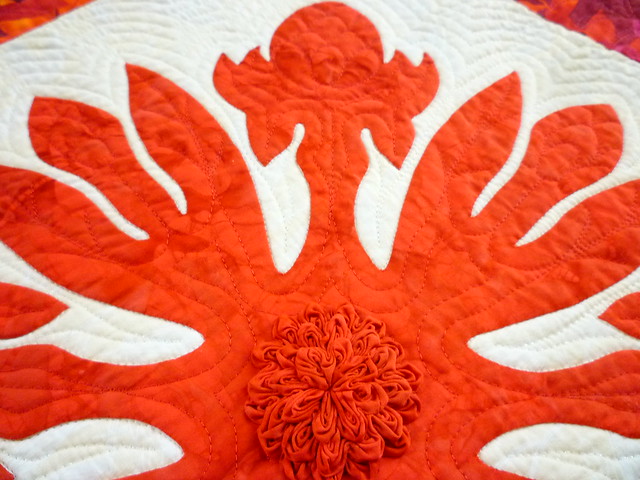
Guess who forgot she was working AGAIN? I swear to God - I don't know what my calendar problem is - obviously I didn't fill in any of my stuff for this week, but it seems like maybe I am also losing my marbles? Or am just having some serious time-disorder? (maybe I am time traveling and don't know it yet! I will be sure to remember this excuse should I need to email my boss again.) At least this time I noticed before I was supposed to be there. Only 25 minutes before, and I still had to take a shower, etc. - BUT STILL. I was only a couple of minutes late. Seriously though, what the hell? This is so not like me I can't even quite process that I did it. This is one of the definite downsides of a variable schedule.
In other news, Grayson the Humane Society cat, who was the only slightly less handsome twin of Busby the My House cat, was adopted today! I'm so glad - he's a really sweet kitty and now I don't feel guilty for not taking him yesterday.
TOMORROW is the day I get my act together. Maybe. I have already checked the schedule and it is clear, so we shall see.
(photo is from a quilt show I went to this last winter.)
these things happened
Posted by
Jen
|
On
Monday, December 12, 2011
I took a short 4 hour job that I thought was for next week, but it turned out to be for... TODAY. And it started while I was blithely standing in the Humane Society looking at cats!
Busby the cat needs a new friend so he's not so lonesome during the day. I was sure that Busby needed a kitten so he could raise him up right. It worked for Dash, surely he'd do it again. HOWEVER, Busby is now 5 years older than he was when Dash came along and maybe he doesn't want a super high energy kitten bouncing off the walls. So the age bar was raised a little and the nice lady at the Humane Society brought out a cat called Grayson - a cat who (VERY WEIRDLY) looked like he could be Busby's long lost twin. This is strange because Busby is HUGE (18+lbs, tall, long) and has long grey fur - unusual! This cat was also all of those things, although he was not as svelte. He was super sweet and friendly, but it just seemed weird to bring home a cat that looks just like the cat already there. I suppose it would be a way to become a crazy cat lady with a special distinction, but that's not a direction I'm currently aiming. I think maybe it's just too early for another cat. I've never in my life gone into a pet shop or shelter to pick out a cat - they've always fallen into my life one way or another and I think I'm scared of making a mistake. I don't want to pick the wrong one and have Busby ( a very sweet and goodnatured fellow) have to suffer the consequences.
MEANWHILE, BACK AT MY JOB - they called and left a message to say "uh, where are you?" which I didn't get until I was home and already supposed to be there for hours. I did end up going in for the last two hours. People were very kind and understanding - worried, even, since blowing off a job is not my usual M.O. Everyone was very nice/cool about it, but of course I felt guilty.
Thing that happened at work: this guy came up to the desk to check out a hold - he was very friendly and nice during his transaction, and then wanted to know how he could donate to the library. I thought he meant books since almost everyone usually means books, but he meant MONEY! I had to rattle around a little to find the right answer (Library Foundation), but he was like "can't I just give you some money right now? Do you have an envelope or something? I really love you guys." ) So I said sure and he counted out a stack of singles from his wallet and I rang it into the cash register and that was that.
Best introduction: a few weeks ago a little boy came into the library with his mother and little sister. He was wearing an orange long sleeve t-shirt and an olive colored vest. He seemed shy, sticking close to his mom until she was putting books into the return slot. He came over to the desk where I was working and said in a loud whisper "I'm Han Solo!" and then ran away. ADORABLE.
100 percent full
Posted by
Jen
|
On
Friday, December 09, 2011
 According to the google moon widget (and my eyeballs) the moon is all the way full tonight. It's just out of view right now as I sit at my desk, but I saw its round white glory earlier tonight when I was out. (out on a glamorous mission to buy an invisible zipper and some hem tape for a cotton velvet skirt that better work OR ELSE I will be sad. It's a beautiful bottle green/teal and so soft! Cotton velvet is a revelation - you can just throw it in the washing machine/dryer and that's that. MIRACLE FABRIC if you like velvet but don't like dry cleaning.)
According to the google moon widget (and my eyeballs) the moon is all the way full tonight. It's just out of view right now as I sit at my desk, but I saw its round white glory earlier tonight when I was out. (out on a glamorous mission to buy an invisible zipper and some hem tape for a cotton velvet skirt that better work OR ELSE I will be sad. It's a beautiful bottle green/teal and so soft! Cotton velvet is a revelation - you can just throw it in the washing machine/dryer and that's that. MIRACLE FABRIC if you like velvet but don't like dry cleaning.)Back to the moon. here's something I noticed tonight - when the moon is full and positioned the way it is positioned in the sky, I can totally see the man in the moon. If I walk while I'm looking at it (this is dangerous in a parking lot), it looks like he's singing. I never see this when I look at a picture of the moon! It's just weird. Maybe there's some sort of atmospheric animation going on.
I realize this picture is not of a full moon, but this lady is so charming on her plywood crescent and we've all seen pictures of the full moon before.
.
.
Oh, wait. Here's one. I love APOD - Astronomy Photo of the Day. (they make a free phone/ipod app if you're into having that sort of thing in your pocket. FYI, I am into having that sort of thing in my pocket.)
see what I mean? It is so beautiful, but I don't see the guy in there. Maybe the angle is wrong? I see craters and oceans and lacy patterns, but no moon-faced opera singer. In the sky, he's totally there. On the screen, not so much.
Here's a BONUS vintage postcard kitten moon landing. Click here. (note: space kittens of the moon wear pleated skirts!)
|
Labels:
kittens on the moon wardrobe. ,
lunar observations ,
moon ,
moon madness
Leave comment
winter sun, complaint department
Posted by
Jen
|
On
Friday, December 09, 2011
the sun is so low this time of year! This was taken just after eleven in the morning, and the sun was right in shine-straight-through-my-eyeballs and-fry-my-brains position. Or maybe it's the headache I woke up with that is frying my brains.
I hate waking up with a headache because that almost always means I was asleep with a headache. In my mind (and where else is there for this range of thought?) sleep with a headache is tainted and any sense of being rested is gone, gone, gone to feed the stupid headache pain. (I'm picturing gentle zzzzzzzs being tipped into the maw of a giant headache volcano.) I can't take any more drugs for it for an hour and just thinking about it makes me nauseated. I never used to get queasy with headaches, but I used to get them a lot more often. A new, fun tradeoff that age has brought me.
OTHER COMPLAINTS:
OSTENTATIOUS DISPLAY: Remember how in the olden days I would grouse at length about holiday themed mall jewelry ads? (especially Jane Seymore's "open hearts" necklace that looks like butts. "hello, darling - here is the diamond butt necklace I assume you were admiring. Dr. Quinn Medicine Woman designed it." I guess it also sort of looks like a deformed swan, but I digress.) ANYWAY - I would volunteer to watch a half hour informercial about diamond butt necklaces (or swans) if it meant I never had to see another one of those gross Lexus with a bow on it commercials. OH MY GOD. The theme music, which in the ads leads to "there's a lexus with a bow on it in the driveway!" excitement, has conditioned me to want to punch someone. It's so out of touch with current reality - maybe that shit would fly back in 2005, but right now the ads promising layaway options seem more in keeping with these financial times.
NO LONGER FEELING TENDER AND MILD: It's December, which means there is Christmas music everywhere. I was scarred early this season (still in November!) when I was in a store for half an hour or so and realized that they were playing the SAME SONG over and over (Silent Night) just sung by different artists. Like waking with a headache, it retroactively ruined the fine time I'd already had. Who thought this was a good idea? Maybe it was different songs. Maybe I was having a holiday hallucination. I've not been listening to much Christmas music at home as a result, which is kind of too bad as there is some good stuff out there.
Hmmm. I may have to make the effort to break the Silent Night Curse. I'm sure there's a thriller out there that already has that name, although it's probably Silent Night Murders and isn't a thriller but instead a cozy mystery about how a small town mall Santa was found murdered in front of a creche and did that wise man's eyes just move? How did we get into this abandoned candle factory? Oh, wait! It is a thriller not a cozy mystery unless the proprietress of the local mystery bookstore who also is the postmaster is the one who saves us. (we are now all life-size candles in a psychopath's holiday diorama! We are not in a thriller or a cozy, but in an episode of Criminal Minds. Don't worry, most of us make it. Happy Holidays!)
MY LACK OF FORWARD MOTION: I feel like I'm hovering over a dozen projects, all bright with possibility, but I can't settle down on anything to really work on. It's annoying and I'm complaining so there it is.
LAST NIGHT'S BONES: I just wanted Brennan to break a chair over Booth's head pretty much through the whole thing, but especially when he wouldn't let her walk on the damned wood floor for fear of her getting a splinter. It's was gross and paternalistic and came across less as concerned and more as controlling asshole. Sweets remains adorable, however.
Woo! I've fooled around long enough thinking of complaints (and, to be honest, eating potato chips*) that I can take more drugs.
*the salt counteracts the nausea, huzzah!
discovery!
Posted by
Jen
|
On
Sunday, December 04, 2011

This year's Christmas tree had a bonus - a real, honest to god bird's nest. So cute! The tree had been cut same day, baled up on the farm and brought into town to the tree place that's near my house. Brought it home, left it outside for a day, brought it in, un-baled it, and ta-da! Bird's nest with bonus EGG. Can you see the egg? (sorry for these pictures - the room was dark and I had to use the flash.)

It just seems lucky somehow - even if it's just to see this unexpected bit of nature in the living room. (ha - I just did some googling and found flimsy and vague "Icelandic good luck to find a bird's nest in your Christmas tree" etc. I'll take it!) The egg was bad, by the way - slimy and faintly smelly with a hole in it. I took it outside. Maybe I can drain it and return it to the nest. Does this counteract my fake Icelandic good luck? I say no.
In any case, the nest will stay in the tree and I'll decorate around it.
how long are V.I.P lines in gothenburg?
Posted by
Jen
|
On
Wednesday, November 30, 2011
TRICK QUESTION! according to the charming Jens Lekman, there are no V.I.P lines in Gothenburg. I like this whole tiny desk concert, but if you want to cut right to his introduction (starts around 8:15) of Waiting For Kirsten, you'll jump right into the setup for his Kirsten Dunst shaggy dog story.
Jens Lekman songs themselves are shaggy dog NINJAS, jumping out of the bushes with lush proclamations of love or a broken heart or comic asides or astute observation or deadpan self-deprication - one following the other until you end up somewhere you never would have predicted at the beginning of the song.
Here's a list from the beginning of the year with the "10 best" Jens Lekman songs if you want to hear more or some with full instrumentation.
Jens Lekman songs themselves are shaggy dog NINJAS, jumping out of the bushes with lush proclamations of love or a broken heart or comic asides or astute observation or deadpan self-deprication - one following the other until you end up somewhere you never would have predicted at the beginning of the song.
Here's a list from the beginning of the year with the "10 best" Jens Lekman songs if you want to hear more or some with full instrumentation.
purple light and tv
Posted by
Jen
|
On
Tuesday, November 29, 2011
I love the bark on this tree - it looked especially pretty tonight as the sun was going down and the sky was turning purple.
Purple sky.
And now, some random television!
Did anyone watch Ringer tonight? This show is B A N A N A S. When you begin with an evil twin/ swapped life/ faked death premise, it's not going to start making sense any time soon. They burn through more plot in one episode than some shows do in a season. Oh, evil Siobhan, what villainy will you commit next? Bonus: Amber Benson was in this episode - it was like Buffy old home week!
COMMUNITY: I love it. I was somewhat late to the show - started by watching Modern Warfare (the season 1 paintball episode) after the internet blew up about it. (I urge you to find it - it's a good standalone episode that demonstrates the lengths they're willing to go. It's also hilarious.) I then caught up one disc at a time via netflix. They're on an unexpected hiatus right now, but I urge you to seek it out if you aren't watching it already - it might not be your cup of tea (fair enough, I guess) but if it is, you don't want to wait any longer.
The Sing-Off: This show and So You Think You Can Dance are the only competition style shows I watch. Oh, wait. I watched The Voice last year too, but I really prefer how they do The Sing Off. (Less gimmick, more singing.) The contestants are all talented and the judges (Shawn Stockman, Sara Bareilles, Ben Folds) generally give considered, constructive criticisms. The finale was on last night and Pentatonix - one of my favorites - won. Nerves caused some strained performances in the live finale, but here's a song of theirs from a couple weeks ago that shows some of what they can do. (note: 3 of these kids are only 19! The rest of them aren't much older.)
Bonus: Ben Folds kept a blog, and this post in particular is very interesting about Reality TV vs. Reality.
|
Labels:
identical twin hijinx ,
purple light ,
songs of Marvin ,
television
4 Comments
hello, color
Posted by
Jen
|
On
Sunday, November 27, 2011

It's raining and the sky is grey, not that it matters since it will be dark in ONE HOUR ANYWAY. Not that I'm counting down the days to the winter solstice and the return of the sun or anything...
Enough about the weather - isn't this fabric amazing? It's Pendleton wool, which they have on huge rolls like this at the Pendleton Woolen Mill store here in Portland. We (me, mom, sister) went yesterday just to look around. AMAZING, as always. The color and patterns never fail to cheer me up. I love that they've been weaving some of these patterns for over a hundred years, yet they look so modern.
I prefer the traditional pattern jacquard wool, which is a reversible, tight, flat, woven wool excellent for blankets or jackets or pillows or whatever. It just occurred to me that a few rolls of this stuff would make the most superior blanket fort in the history of blanket forts.

I love the bold geometrics. The teal on the bottom is even better (greener, richer) in person. They have lots of other Pendleton fabrics at this store in addition to weirdo ends and scraps from the mill. The weirdo ends and scraps are my favorite! I didn't get any yesterday because it was holiday-weekend picked over, but I still have a huge bag from last time...
being sad
Posted by
Jen
|
On
Tuesday, November 22, 2011

The wind is whipping and the rain is dumping down which is gross and terrible, but it suits my mood today which is gross and terrible. Our sweet orange boy Dash was hit by a car late Sunday/early Monday. Such a good cat! He was sweet and feisty, funny and weird, but most of all a beloved part of the family. He and Busby (other cat) got along so well - Busby's already figured out something is wrong and it breaks my heart to see him looking all over the house for Dash - it's exactly what I did before I went looking around the neighborhood and found him the way nobody wants to find a lost pet. He had a good life, but it wasn't long enough. He loved to sleep in the sun in the middle of the garden, he loved climbing trees and catching bugs, he loved sleeping on his back in front of the fireplace, he loved hanging out with Busby, he loved making biscuits and napping in cupboards.
He was also a cat of many names - here are the ones I can think of:
biscuits
itty bits
hobo joe
egyptian red
orange busby
orange cooney
dr. lady baby
the neck nurse
ned nickerson
foxy bananas
poncho maccardle
flashheart
nuu-nuu (but only in the summer when he'd shed his coat)
chester cheeto
sunbeam pete (any cat chasing the sun to nap in gets called this)
He was the most CAT cat I've ever lived with- full of adventure and affection and a particular cat-like joie de vivre. (I'm not saying I loved it when he brought bird after bird into the house, but he did it with such pride and enthusiasm.) I will miss his oven-like warmth, his sweet face, his insistent meow, his soft thick fur, the clatter of his kibble on the plastic tray underneath his bowl (he was a messy eater), but most of all the simple pleasure of his company. I miss him so much and wish that he was spending this wretched day stretched out in front of the fire or curled up in his favorite cardboard box.

uniforms, caps, fezzes, regalia
Posted by
Jen
|
On
Thursday, November 17, 2011

REGALIA???? I am perhaps most intrigued by this aspect of the Nudelman Bros. insignia. It's probably for the Queen of the Elks or the Regal Rotarian or King B.P.O.E. or H.R.H, Empress of the Masons or whatever. BUT STILL. Maybe they were turning out capes for the minor royalty of Europe, maybe "regalia" means the gold tassel on a fez. I don't know, but I sure like wondering about it.
These patches are in a nursing cape that belonged to my grandfather's third wife. I didn't know her very well, but she was funny, tart, tall and strapping and I can totally imagine her striding around in her blue wool nurses cape fixing things with bandages or a pointed look.

|
Labels:
fez business ,
nudelman bros ,
regalia ,
uniform tailors
Leave comment
three incompatible things I have to do today
Posted by
Jen
|
On
Tuesday, November 15, 2011
1) APPLY FOR JOB - the job closes tomorrow, there will be thousands of applicants and I don't have any expectation that my application will go anywhere, but I have to do it or I will be plagued with guilt and shame for not even trying. What kind of weirdo doesn't even try, Jen? I would really like this job - I think I could be very good at it, but I'm sure the other 4000 people applying feel the same. Particular challenge: summing up my specific rad-ness and constitutional suitability for the position in 150 words or less without using the word RAD.
2) PAINTING THE ROOM - the room where the fabric and other craft supplies have been stacked in squalor for far too long. This is way overdue and already halfway done, but it requires paint clothes and getting dirty and wah wah wah. I can knock most of this out today (all but the floor), but it will take a lot of advanced do this then that planning - which is FINE as long as the paint dries as fast as I think it should. (note: it almost never does.)
3) CATCHING UP ON NANO - I am participating in Nanowrimo this year! (I like writing it without all the in the middle Capital Letters because then it reminds me of Nanaimo, which is a very nice place.) This has been a very good thing so far and I have more to say about it, but right now I'm behind. I'm right on the precipice between being able to catch up with a little extra effort, and being too far behind to do anything but type for 2 weeks straight. I don't have time to do that second thing! I need to do some work today if I'm going to stay on the right side of this, but it's incompatible with being painty! I will figure it out.
The photo above was taken out of the window by my desk yesterday - it looks almost exactly like this today, except there is a lot more fog and leaves on the ground. I am so jealous of this slide! In the summer the neighbor kids put an inflatable pool at the bottom and fix a hose at the top for a pretty sweet slip and slide situation.
november!
Posted by
Jen
|
On
Tuesday, November 08, 2011

This is what it looked like when I was walking into work this morning. The figure up ahead is the youth librarian, returning from her lunch. [EDIT: it was 2PM! where is my head?]
What are you reading? I have a bunch of things lined up, and have read a bunch of really fun things just recently (more on those in future), but right this very moment I am reading two things:
Miss Peregrine's Home for Peculiar Children: I'm almost half way through and have to read the rest of this tomorrow or, you know, pay late fees (which I will do). This was a slow start for me, but it's probably because I didn't sit down and read 50 pages at once to get right into it. The book is like a YA picture book with creepy photos, which is FUN, but I'm having some trouble with the voice of the narrator - it's supposed to be 1st person 16 y.o. boy, but there's a lot of description and that description is very evocative, but...writerly. Although I think I may have just figured out a way to read further without going "I doubt very much he would have described the light as 'gauzy'!" Maybe this story is being told in retrospect by a former 16 year old who is now a writer and therefore prone to describing things as gauzy or "leaving a trail of parenthetical scars on the floor." I'll let you know!
A Homemade Life: Stories and Recipes from my Kitchen Table: This is for my non-fiction book group - it's a series of essays about food and family followed by a recipe. Every single recipe has made me hungry and the writing is really lovely.
directional indicators
Posted by
Jen
|
On
Saturday, November 05, 2011
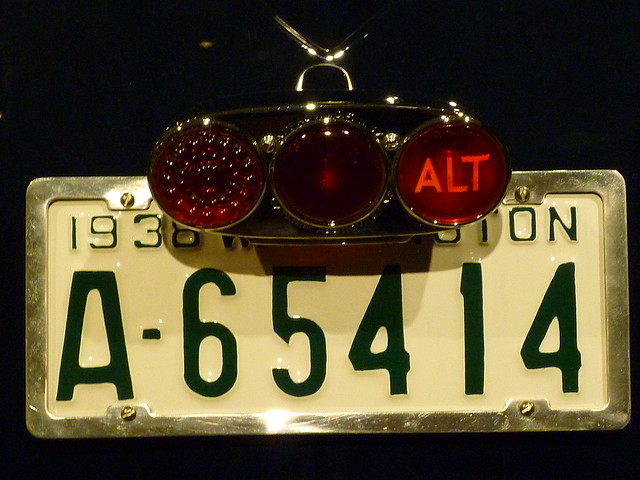
I finally uploaded my photos from the fancy car exhibit I went to this summer. It was so cool! I think this might have been on the Bentley - I love the texture of the light on the left, and of course the ALT on the right. I will be posting more pictures from the exhibit - I'm not a capital CAR car person, but there's no denying the graceful and beautiful design in some of these Automobiles of Yore. They're so far removed from the mass produced cars of today they might as well be cars from another planet.
UNRELATED LINKS: Stratford on Hellmouth: fun! Spoilery if you haven't seen the end of certain Joss Whedon shows like Buffy. (this warning is mostly for Leslie!)
Kickstarter for Portland's Dill Pickle Club - this looks so cool! It's to build a social history/take your own downtown tour app. What I especially love about it: they want to make the app free to users AND it's an open source project so other cities could build something similar. One of the things I love best about this country is how uniquely weird each part of it is - what a great way to share that knowledge.
all hallow's eve, eve
Posted by
Jen
|
On
Sunday, October 30, 2011

Ha! I love this idea.
I haven't even carved a jack o'lantern yet. I'm gonna before it gets dark tomorrow, I swear! It doesn't take a long time because I'm a jack o'lantern traditionalist: I like triangle eyes, a triangle nose, and a wide gappy smile. That's it! No fancy headless horseman/ Ron Swanson/ Yoda or whatever - straight up JACK O'LANTERN for me. I genuinely admire the fancy pumpkins of others, but it is not my way.
looks good to me
Posted by
Jen
|
On
Thursday, October 27, 2011
I saw this trailer for the movie The Artist this morning and I wish I could watch the whole thing right now. It looks to be mostly silent (w/music) and also French. But since there's no apparent dialogue, I won't have to read subtitles! Anyway - I love the look of it.
In other news, I just remembered that I'm working today! I'd better go get myself together.
In other news, I just remembered that I'm working today! I'd better go get myself together.
yellow
Posted by
Jen
|
On
Tuesday, October 18, 2011

I just uploaded some photos from July (!) - I thought these two had a kind of fall color cast to them, so here they are. The top picture is of echinacea (coneflower) and the bottom is of echinacea and yarrow. So pretty! These aren't from my garden, but I just got an echinacea called 'harvest moon' this summer. Pretty, pretty.

It's sunny and windy here today. I'm trying to get some stuff planted (that should have been planted AGES ago) before we get our first freeze. Hopefully I'm enough weeks ahead (or even one week ahead!) so the plants can establish themselves a little.
Wordstock 2011: ring ring
Posted by
Jen
|
On
Sunday, October 16, 2011
This year I attended Wordstock on Saturday only - usually I go all day, both days but 2011 provided a combo of a stinking cold plus a visit from my California uncle. (Ha ha! That sounds like some kind of euphemism. “Oh, I’d love to go but I’ve got a visit from my California Uncle if you know what I mean.” I don’t know what it would mean, but in this instance it was truly my mother’s brother who lives in Fresno, visiting.) Anyway - it was a great day, but I spent most of it trying not to cough. Between cough drops and my water bottle, I think I did pretty well.
Everything was great. Every single thing! Oh, wait - there were some un-great things, but those were mostly noise related. It’s tough when you’ve got three stages going in the same hall, and one of those stages is singing, you know? Everything I attended was top quality, content-wise. On the shopping side, it seemed like there were fewer exhibitors, but that could be just how they had the thing laid out - I didn’t have as much time to peruse since I only had one free hour the whole day. The website and the booklet were FINALLY written so it was easy to cross-reference authors, so that’s another plus.
11:00 - Peter Mountford and Steve Almond, Wordstock Community Stage: awesome. We were a little bit late since I was sure that they were reading at one of the big stages in the main area. They were across the way in one of the lecture rooms, but these are actually better because it’s not so crazy noisy. Peter Mountford had pneumonia, which certainly put my own cold into perspective. If he could sit there and read long passages from his novel without passing out, surely I could sit and pay attention for the whole time with minimal cough drop wrapper rustling. I like to think I succeeded. Mountford read first, from his recently published novel A Young Man’s Guide to Late Capitalism - it’s his first, but the writing sounded very assured to my ears. I was intrigued by the premise (high finance and La Paz, Bolivia) and quite liked the section he read - will definitely read this book. You should read it too, then we can talk about it.
Steve Almond read from his new story collection (God Bless America: Stories) next - I’ve seen him read several times now and he was engaging as always. This time he was especially good - the new collection isn’t memoir-based essays(as his last one was), but short stores - the example I heard was strong all on its own, not bolstered by how likable Steve Almond is, if that makes any sense. The piece he read from was about poker, psychiatry, psychology, and the decor of suburban casinos. (Donkey Greedy, Donkey Gets Punched.) While he was reading, someone’s cell phone rang. Not just a little beep or blip, but a full on rumba. This understandably threw Almond off. As seems to always be the case with disruptive rings, it kept ringing - like the phone owner had accidentally put it behind a bunch of zippers or locks that had to be dealt with before it could be turned off. All eyes scanned the room, Almond said in the classes he teaches, he tells the person with the ringing phone that he will give them an F if they don’t take the call and pretend that nothing weird is going on. Ha ha! Awesome. He resumes reading. The phone rings again in a few minutes - obviously the same one due to the distinctive ring. The crowd is so totally against this phone person now - it sweeps through the room like unspoken mob intelligence. But Almond is classy and shows compassion, saying ‘hey, we don’t know. Maybe somebody is pregnant or sick.” (My sister and I discussed this afterward and agreed that this is what phones in your pocket set on vibrate are for.) He resumes reading. The phone owner slips out.
Everything was great. Every single thing! Oh, wait - there were some un-great things, but those were mostly noise related. It’s tough when you’ve got three stages going in the same hall, and one of those stages is singing, you know? Everything I attended was top quality, content-wise. On the shopping side, it seemed like there were fewer exhibitors, but that could be just how they had the thing laid out - I didn’t have as much time to peruse since I only had one free hour the whole day. The website and the booklet were FINALLY written so it was easy to cross-reference authors, so that’s another plus.
11:00 - Peter Mountford and Steve Almond, Wordstock Community Stage: awesome. We were a little bit late since I was sure that they were reading at one of the big stages in the main area. They were across the way in one of the lecture rooms, but these are actually better because it’s not so crazy noisy. Peter Mountford had pneumonia, which certainly put my own cold into perspective. If he could sit there and read long passages from his novel without passing out, surely I could sit and pay attention for the whole time with minimal cough drop wrapper rustling. I like to think I succeeded. Mountford read first, from his recently published novel A Young Man’s Guide to Late Capitalism - it’s his first, but the writing sounded very assured to my ears. I was intrigued by the premise (high finance and La Paz, Bolivia) and quite liked the section he read - will definitely read this book. You should read it too, then we can talk about it.
Steve Almond read from his new story collection (God Bless America: Stories) next - I’ve seen him read several times now and he was engaging as always. This time he was especially good - the new collection isn’t memoir-based essays(as his last one was), but short stores - the example I heard was strong all on its own, not bolstered by how likable Steve Almond is, if that makes any sense. The piece he read from was about poker, psychiatry, psychology, and the decor of suburban casinos. (Donkey Greedy, Donkey Gets Punched.) While he was reading, someone’s cell phone rang. Not just a little beep or blip, but a full on rumba. This understandably threw Almond off. As seems to always be the case with disruptive rings, it kept ringing - like the phone owner had accidentally put it behind a bunch of zippers or locks that had to be dealt with before it could be turned off. All eyes scanned the room, Almond said in the classes he teaches, he tells the person with the ringing phone that he will give them an F if they don’t take the call and pretend that nothing weird is going on. Ha ha! Awesome. He resumes reading. The phone rings again in a few minutes - obviously the same one due to the distinctive ring. The crowd is so totally against this phone person now - it sweeps through the room like unspoken mob intelligence. But Almond is classy and shows compassion, saying ‘hey, we don’t know. Maybe somebody is pregnant or sick.” (My sister and I discussed this afterward and agreed that this is what phones in your pocket set on vibrate are for.) He resumes reading. The phone owner slips out.
I don’t have a lot of notes from the Q & A, which started with them asking each other questions. I did note that each seemed to genuinely enjoy the others’ work, which charmed me - a nicely supportive yet funny and self-depricating environment. Almond predicted that there would be an awkward silence before the Q&A started, but I think people only generated the awkward silence because we didn’t want to disappoint him. The questions from the crowd were mostly about writing process, as they always are at every reading I’ve ever attended. When asked about his process Almond said it’s a lot of humiliating badness, then figuring out his diurnal schedule (do you write better in the morning or the night? Write then.) and getting to work when he finally tires of the bullshit. Mountford talked about having a broad pool of trusted early readers - he said he does it this way because you can tap out a resource (“they don’t return my emails”) and it’s good to get a spectrum of opinion (but not too early). They said a lot of smart things that I didn’t write down. (sorry! I was sick.)
Almond & Mountford, Mountford & Almond - the names together sound like a 70s songwriting team or maybe a specialized detective agency. As far as I know they don’t do these things, but they DO write very well. If you get the chance to see them read together or apart, you should take it.
More Wordstock to follow!
Almond & Mountford, Mountford & Almond - the names together sound like a 70s songwriting team or maybe a specialized detective agency. As far as I know they don’t do these things, but they DO write very well. If you get the chance to see them read together or apart, you should take it.
More Wordstock to follow!
|
Labels:
don't you want to get that? ,
reading ,
short stories ,
wordstock ,
writing
1 Comment
caption technology v. the forest
Posted by
Jen
|
On
Friday, October 14, 2011
Oh, hey! Check it out - I escaped from the captions. They keep changing things on blogger which is great because a lot of them needed changing, but it sometimes takes a little while to figure out what's going on. Anyway - this was a tiny portion of the lovely things I saw on Sunday. I hope I'll have some Wordstock stuff up this afternoon.
what I think will happen
Posted by
Jen
|
On
Saturday, October 08, 2011
Today is Wordstock day! Normally, I like to go for all day, both days but I'm not sure if that's going to work this time or not. I have ANOTHER stupid cold and my uncle is visiting from California, both of which curb my natural Wordstock inclinations. We'll see how it shakes out by the end of today.
Speaking of which, here's my tentative schedule:
11:00 Steve Almond
12:00 Julia Glass & Diana Abu-Jaber
1:00 Jennifer Egan (!!!!!!!!! one thousand !!!!!!!!!s)
2:00 lunch OR Michael Ondaatje OR Vera Brosgol & Jonathan Hill (you should read VB's Anya's Ghost if you haven't already - it's fantastic.)
3:00 Craig Thompson, probably
4:00 panel: Pushing the Limits of Form in Fiction (feat. Jennifer Egan)
5:00 Carson Ellis & Colin Meloy
Looks good, right? A few of those things happen at the same time as other things I'm interested, so it's open to change.
this makes me happy
Posted by
Jen
|
On
Friday, October 07, 2011
Is there nothing Beyoncé can't do? Not that I want her to not do it - I love that she seemingly accomplishes anything she sets her mind to and that her mind is always pushing and moving forward. Beyond that, I just love this video - love the song, love the Funny Face/ Flashdance/ Supremes/ Everything Else references, love the color, love that I know she worked hard on it (because she works hard on everything) yet it looks so effortlessly FUN.
(via the entire internet, but I saw it first here, where you should go and read, then you should go here and click the link. For real - CLICK THE LINK.)
(via the entire internet, but I saw it first here, where you should go and read, then you should go here and click the link. For real - CLICK THE LINK.)
mystery of the day
Posted by
Jen
|
On
Tuesday, October 04, 2011
The month's barely begun, but already I have lost things. NAMELY:
1) External paper for CD I checked out of the library. I had the case sitting on my desk and a cough drop MELTED ON IT. (it like, melted from within - I'm casting a dubious eye at ricola these days.) Anyway, the library CD case has a plastic cover protecting the outer artwork - I fished it out so I could rinse melted cough drop lava off without ruining the paper. I put it in a safe place - so safe I can't find it. And it's due in two days! And I can't renew! AGONY! I know it's got to be here somewhere. (Looks under computer for the 300th time...)
2) Dang, I know there was at least one other thing gone missing, but I can't remember what. I know, let's make a list of where this paper might be instead. Oooh, blogger has a number button. I think that's new. I am pushing the number button!
1) External paper for CD I checked out of the library. I had the case sitting on my desk and a cough drop MELTED ON IT. (it like, melted from within - I'm casting a dubious eye at ricola these days.) Anyway, the library CD case has a plastic cover protecting the outer artwork - I fished it out so I could rinse melted cough drop lava off without ruining the paper. I put it in a safe place - so safe I can't find it. And it's due in two days! And I can't renew! AGONY! I know it's got to be here somewhere. (Looks under computer for the 300th time...)
2) Dang, I know there was at least one other thing gone missing, but I can't remember what. I know, let's make a list of where this paper might be instead. Oooh, blogger has a number button. I think that's new. I am pushing the number button!
- the most obvious place that the paper is, is under other papers. Hiding in plain sight. The good news is that I have lots of papers and it could be right here on my desk. The bad news is that I have lots of papers and it could be right here on my desk and I may never find it even after looking for a year.
- spirited away in the dead of night by someone who is gaslighting me with library materials. This seems less likely, but YOU NEVER KNOW.
- I have tested, and the blogger number button won't let me make numbers under numbers.
- I should be reading the Henrietta Lacks book since the non-fiction bookgroup is reading it this weekend, but Wordstock is this weekend! Once I realized they overlapped, I didn't read even one page, although though I really do want to read it. Several members of the bookgroup have read it before and were fighting* about it before we discussed The Big Burn. I want to read it so that I might fight about it, too!
- *for library non-fiction bookgroup definitions of "fighting." There were no fists and only a little shouting. It seems (from my very informal observations) that the hard-science people are of the "cells are just cells" camp and other people are "I see your point, but !!!!!!" and then the science people say "stem cells, etc. etc." and other people are like "hmmmm. Yes, but" and then everyone started talking about wildfires instead since it was 2 o'clock and it was time to talk about wildfires. I wanted to talk about the bromance between Teddy Roosevelt and Gifford Pinchot, but there was so much to talk about we didn't cover it as thoroughly as I would have liked. (WHITE HOUSE UNDERWEAR WRESTLING/BOXING!)
- I am trapped in the blogger numbered list forever.
today, the beach!
Posted by
Jen
|
On
Friday, September 30, 2011
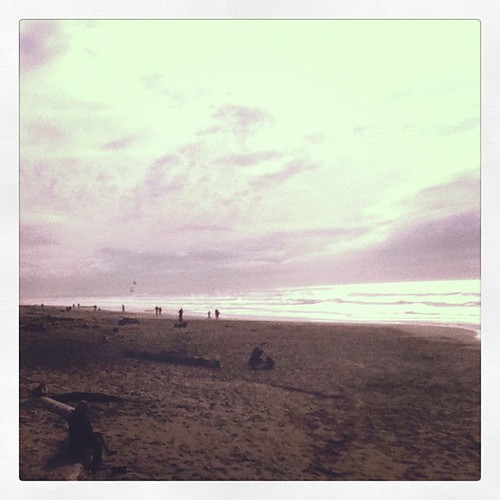
The sky was crazy, but that's fine. We all have our moments. This is Instagram processed, but the sky really did look this tinfoil color. (I have regular camera pictures to prove it, but as always those come later.)
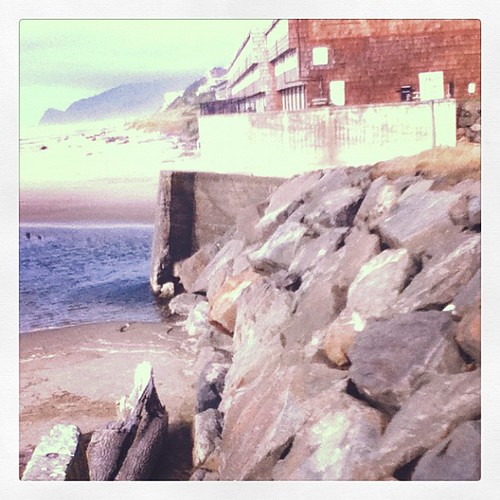
there's a little blue here. This is facing north, the previous picture was south. It's really blown out, but that blob of white to the left of the hotel is sand, the dark splotch above is a rock/mountain/something that reaches goes right out into the water. They used to drive around it in the olden days (when the tide was out.)
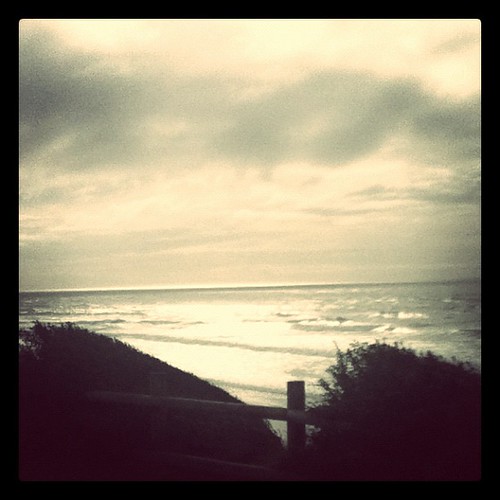
This was from a part of Lincoln City called Road's End. The water was dark, but had this LIGHT coming off it anyway - maybe like a suit of armor that needs to be polished hit with a really big flashlight. (or the sun I guess if you have no flashlight poetry in your soul.)

This was the sky at around 4pm. This is a picture of the sun.
ANYWAY. Getting out of town and standing in front of the ocean was lovely as always. It always is, no matter the weather or state of the sky.
September has been my least-blogging month in years - what's up with that? I like the looks of October though, blogging wise.
battery race
Posted by
Jen
|
On
Saturday, September 24, 2011
I am sitting outside. There's a breeze and when I looked up just now, there was a cloud that looked like a cartoon fish skeleton. And now a giant squid. Maybe I should keep my eyes on my keyboard. Anyway - I've been such a terrible procrastinator lately I thought I'd blog race to the end of my laptop battery - because once I go inside to plug it in, I will no doubt be distracted by a million things. That's just the way of it these days.
1: See this picture over here? I read this (The Unwritten: Tommy Taylor and the Bogus Identity) yesterday and enjoyed it very much. It seems like there's been a lot of media lately about reality v. fantasy and meta bleed-through from one to the other. This is sort of in that area, but also talks about fan culture - in this case of a very popular children's series coughcoughHarryPottercoughcough.
Also something about an evil cabal strong arming writers to do their evil will... I've already put the second volume on hold because I want to see what happens next. Warning: this book is gross and gory in parts, but nothing so bad that it kept me up at night or anything. (I'm a delicate flower, re: horror.)
2: Wordstock is coming! Jennifer Egan will be there! I am excited!
3: OMG. The kindle/library lending thing just started, and it's AWESOME! It's been very easy to navigate so far, I only wish there were more available titles (which I assume time will take care of) and that there was a way to return a book early if I'm done with it so someone else could check it out. (each e-book is purchased by the library separately can only be checked out to one person at a time.)
The library's had e-books (and downloadable audio books) for a long long time, but the kindle association is new. I remember the look of total confusion on the face of a dude (who thought he had really found a way to rook the system) when I explained that he would have to wait just as long or longer for the new George R.R. Martin e-book as he would for the physical book. He thought that since it was electronic there was unlimited access! "It's just a file!" he said as a thousand publishers 3,000 miles away clutched their pearls without knowing why. My first library kindle book: Dangerous Angels by Francesca Lia Block. LOVE. Lanky lizards indeed.
I'm almost in the battery red! let's see... oh, yes:
4: DURAN DURAN tonight! Woooooooo! for Miz Tara's b-day. WOOOOOOOO!
oops. now it is in the red. That is all for today's battery blog race.
1: See this picture over here? I read this (The Unwritten: Tommy Taylor and the Bogus Identity) yesterday and enjoyed it very much. It seems like there's been a lot of media lately about reality v. fantasy and meta bleed-through from one to the other. This is sort of in that area, but also talks about fan culture - in this case of a very popular children's series coughcoughHarryPottercoughcough.
Also something about an evil cabal strong arming writers to do their evil will... I've already put the second volume on hold because I want to see what happens next. Warning: this book is gross and gory in parts, but nothing so bad that it kept me up at night or anything. (I'm a delicate flower, re: horror.)
2: Wordstock is coming! Jennifer Egan will be there! I am excited!
3: OMG. The kindle/library lending thing just started, and it's AWESOME! It's been very easy to navigate so far, I only wish there were more available titles (which I assume time will take care of) and that there was a way to return a book early if I'm done with it so someone else could check it out. (each e-book is purchased by the library separately can only be checked out to one person at a time.)
The library's had e-books (and downloadable audio books) for a long long time, but the kindle association is new. I remember the look of total confusion on the face of a dude (who thought he had really found a way to rook the system) when I explained that he would have to wait just as long or longer for the new George R.R. Martin e-book as he would for the physical book. He thought that since it was electronic there was unlimited access! "It's just a file!" he said as a thousand publishers 3,000 miles away clutched their pearls without knowing why. My first library kindle book: Dangerous Angels by Francesca Lia Block. LOVE. Lanky lizards indeed.
I'm almost in the battery red! let's see... oh, yes:
4: DURAN DURAN tonight! Woooooooo! for Miz Tara's b-day. WOOOOOOOO!
oops. now it is in the red. That is all for today's battery blog race.
make two pictures and call me in the morning
Posted by
Jen
|
On
Sunday, September 18, 2011
I have been a lapsed blogger since my road trip return - I've also been a terrible e-mail correspondent and so on (ha ha - my fingers slipped, so first I wrote "xo on" and then it was "zo on" like my fingers want to write this with some kind of movie-fake heavy accent to distract you from my weak excuses). If I were a blog-doctor and forced to give a diagnosis (just so you know, the blog-doctor of my imagination wears a white coat and a stethoscope around her neck), I would say I've been taking a little mind-break and that's okay. The trip was wonderful, but I think it's taken me this long to achieve my introvert-balance again.
One of the most fun things I've done (and am doing!) since my return has been an art challenge with Martina and my sister. We took a pledge to make one new thing a day for 100 days - so far I've been doing sketches and watercolors. We've only been doing it for 19 days so far, but it is so fun! I have no expectations of myself in this arena which is TOTALLY LIBERATING. I sit down to do my thing which might lead to wondering (like today) "how the BLEEPING BLEEP am I supposed to draw ice?" and it's fun - a challenge, not a disappointment that I don't auto-magically know how to render ice in a glass or whatever. We post them to a circle on Google +, and then I put mine into a box and that's that. Michaels has a new line of cheapo student art supplies which makes it even easier to say "oooh, I'll try that." (watercolor set w/ 36 colors = 4.99)
ANYWAY - all of this is to say that I think I'll be back soon with some book reviews or at least links to awesome things because I have seen so many awesome things.
no title (the news)
Posted by
Jen
|
On
Saturday, September 10, 2011
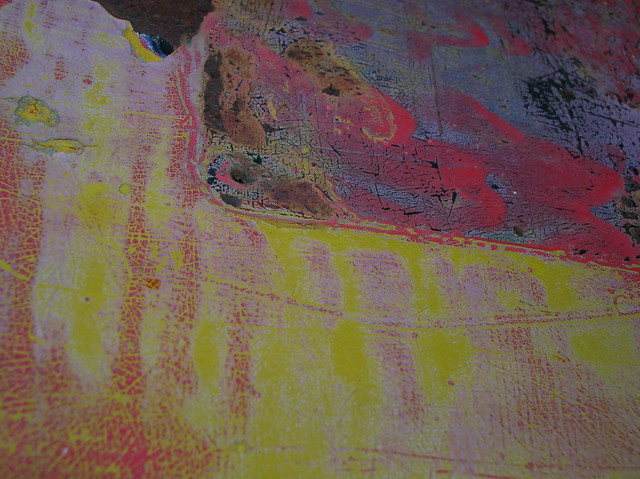
• I'm reading The Big Burn by Timothy Egan (which is excellent) while the sky here in Portland is hazy from the Dollar Lake fire up on Mt. Hood. I've read past the Theodore Roosevelt/Gifford Pinchot bromance (more on that in future) and now I've read up to the middle of this raging fire. Terrifying! I can't even imagine how horrifying it must have been to have your choices narrowed to burning to death or - if you were lucky - most likely suffocating in an abandoned mine. Fire prevention, detection, and fighting is more sophisticated now than it was in 1910, but it's still scary business. All fire-dousing thoughts to those fighting fires all over the west this summer and fall.
• Yesterday was blackberry picking day and my arms are covered in tiny scratches. Worth it, though! My sister and I were part way down a horse trail at the Willamette Mission state park when a voice asked us if we would step out of the bramble. Weird, right? Is this a stick-up? But no! It was a woman on her horse, and the horse was freaked out because he could see our bright colored shirts and couldn't tell that we were mild mannered cheapskates picking berries on public land. We stepped out, and he was no doubt still a little freaked because of our giant bug sunglasses and shiny bowls. The horse lady was very nice and explained that the world looks different to horses. I was not offended. The horse even aalllmost took some berries from my hand, but in the end decided that he would decline all offerings from bright shirt wearing bugeye having shiny bowl holding mild mannered cheapskates. I can't say that I blame him. (although I ate the berries he rejected because those were some good berries!) We also picked up some hazelnuts since it's getting to be that time of year and the park has a hazelnut grove. I think those will be better in a few weeks.
• I'm trying to be organized for my painting project. Instead of my usual pell-mell slapdash of rushing out to buy supplies and starting RIGHT NOW, I'm trying to plot it out. It's more complicated since I'm going to paint the floor without taking all the furniture out. I have to paint the walls before the floors, but put up baseboard (which I need to paint to match the walls) after I paint the floor. It's turning into one of those "if a train leaving at 4pm has apples on it..." kind of math problems - when I think about it too hard I just want to lie down. One step at a time - I don't think it will be nearly so bad once I get underway.
dahlia weekend
Posted by
Jen
|
On
Monday, September 05, 2011
The Dahlia festival down in Canby has been going on all weekend - I saw it on Friday, and it was truly beautiful! These are some instagrammed pics from my ipod. I have some I took on a regular camera that I will probably post at some point, but these are more timely and handy.
I love dahlias - they are a big burst of color at the end of the summer.
I used this instagram filter (toaster) because it reminds me of the polaroid photos my grandpa used to send us of his garden in portland. Roses, dahlias - all seemed so exotic to me in Florida, where it was mostly too hot for the old fashioned garden flowers.
Rows and rows and rows - acres of dahlias! More information on dahlias here.
and one more!
reading about fires and rich dudes
Posted by
Jen
|
On
Monday, September 05, 2011
 I'm currently reading Timothy Egan's The Big Burn: Teddy Roosevelt and the Fire that Saved America for my non-fiction book group. It's about the huge forest fire that blazed across Montana, Idaho, and Washington in 1910 and the birth of the US Forest Service. I'd heard that it was a good book, but I had no idea how much I would enjoy it! I'm still in the early parts where he's setting the scene. I guess I really didn't have much of an image of Teddy Roosevelt except that he was a massive extrovert who carried a big stick - I'm loving this view of him as a progressive conservationist (...who also wrestles people in his underwear).
I'm currently reading Timothy Egan's The Big Burn: Teddy Roosevelt and the Fire that Saved America for my non-fiction book group. It's about the huge forest fire that blazed across Montana, Idaho, and Washington in 1910 and the birth of the US Forest Service. I'd heard that it was a good book, but I had no idea how much I would enjoy it! I'm still in the early parts where he's setting the scene. I guess I really didn't have much of an image of Teddy Roosevelt except that he was a massive extrovert who carried a big stick - I'm loving this view of him as a progressive conservationist (...who also wrestles people in his underwear). Don't these robber barons sound strangely familiar? Except now instead of being fought on behalf of the "small man," they get enormous tax breaks? Here's a quote from a section I read this morning on my break:
John Rockefeller was perhaps the richest American who ever lived. Morgan and Weyerhaeuser were not far behind, each with a net worth roughly equal to that of Bill Gates, the Microsoft co-founder, in contemporary dollars. Rockefeller had more than four times the wealth of Gates, his stake at just under $200 billion, when adjusted for inflation. As to Roosevelt's view of these men, he was rarely discreet. He called them "the most dangerous members of the criminal class, the malefactors of great wealth," in his best-known phrase, uttered during a sharp economic downturn. And he was more cutting when he really wanted to be dismissive.
"It tires me to talk to rich men," he said. "You expect a man of millions to be worth hearing, but as a rule, they don't know anything outside their own business." When Standard Oil donated $100,000 to Roosevelt's campaign, the president asked that it be returned. It was somewhat jarring, to say the least, that Roosevelt, from a wealthy New York family, and Pinchot, who had inherited a chateau with twenty-three fireplaces, had turned so vehemently against their class, envisioning the national forests as a way to "help the small man make a living rather than help the big man make a profit," as Pinchot said freqeuntly. But once engaged, they never looked back.
|
Labels:
books ,
fire ,
reading ,
robber barons ,
wrestling in underwear
Leave comment
love that bridge
Posted by
Jen
|
On
Tuesday, August 30, 2011
I saw AgesandAges as an opening, opening act on Friday and I enjoyed their set so much! Even from far away with the crowd still arriving, even though there are a lot of band members and they had to stand in front of two other bands' equipment - they stuck in my head and I had to come home and do some internet searching right away.
Video #1 Navy Parade (escape from the Black River Bluffs) - this video gives a fine view of St. Johns (in North Portland) in the wintertime. I L-O-V-E the St. Johns bridge and you can totally see it in this video along with green jello, some sort of fraternal lodge interior, doctor's office waiting room interior, hey - that one guy looks kind of like Ryan Murphy, cafeteria interior, paper hats, squeaky vinyl banquette St. Johns bar interior, THE BRIDGE, handclaps, tambourines, la la la-ing my heart out, AgesandAges I will hold your hand even though these sort of public displays are outside my bubble of comfort.
Video #2 So So Freely - reading about this band I've seen "tent revival" mentioned more than once. It makes sense - the blended voices, the rise and fall; there's a revival rhythm there, for sure - but also the sense that we work on these problems of life together. (I haven't been to anything that would be called a revival in a lo-oong time, but it was a factor in my childhood and I just saw some old-time camp meeting tents on my road trip - I'm experiencing some reflexive nostalgia despite linking to a video called 'no nostalgia' and having no desire to go to a religious revival ever again.)
Video #3 No Nostalgia - I haven't heard the album yet (I will!) and I expect to enjoy it - but do see them live if you can.
Video #1 Navy Parade (escape from the Black River Bluffs) - this video gives a fine view of St. Johns (in North Portland) in the wintertime. I L-O-V-E the St. Johns bridge and you can totally see it in this video along with green jello, some sort of fraternal lodge interior, doctor's office waiting room interior, hey - that one guy looks kind of like Ryan Murphy, cafeteria interior, paper hats, squeaky vinyl banquette St. Johns bar interior, THE BRIDGE, handclaps, tambourines, la la la-ing my heart out, AgesandAges I will hold your hand even though these sort of public displays are outside my bubble of comfort.
Video #2 So So Freely - reading about this band I've seen "tent revival" mentioned more than once. It makes sense - the blended voices, the rise and fall; there's a revival rhythm there, for sure - but also the sense that we work on these problems of life together. (I haven't been to anything that would be called a revival in a lo-oong time, but it was a factor in my childhood and I just saw some old-time camp meeting tents on my road trip - I'm experiencing some reflexive nostalgia despite linking to a video called 'no nostalgia' and having no desire to go to a religious revival ever again.)
Video #3 No Nostalgia - I haven't heard the album yet (I will!) and I expect to enjoy it - but do see them live if you can.
is there something I should know?
Posted by
Jen
|
On
Monday, August 29, 2011
I've decided today is Get Ready To Paint Day - I'm going to paint one wall and two parts of a different wall so they're all the same color. Then I'm gonna paint the floor! Woot! But first the boring hard parts, which is putting everything away, moving things away from the wall, etc. Because I'm me, not everything has an "away" - sitting on a pile on top of the bookcase/table/floor is not away when it comes to paint. (I just indulged in an hilarious self-pitying heavy sigh at the thought of it.) But PAINT. I will persevere because it's gonna look awesome.
NOW IS THE TIME FOR VIDEOS!
my ipod just played this - ha ha ha! these videos always make me laugh, but it's out of fondness for and not embarrassment at my former Duran Duran obsessed self. (Also, they made AWESOME VIDEOS and I will thumb wrestle anyone who says otherwise.) (I have double jointed thumbs - you will not win.)
I was going to post a video for a band I saw on Friday, but I think I'll give them a separate post later today.
NOW IS THE TIME FOR VIDEOS!
my ipod just played this - ha ha ha! these videos always make me laugh, but it's out of fondness for and not embarrassment at my former Duran Duran obsessed self. (Also, they made AWESOME VIDEOS and I will thumb wrestle anyone who says otherwise.) (I have double jointed thumbs - you will not win.)
I was going to post a video for a band I saw on Friday, but I think I'll give them a separate post later today.
eureka!
Posted by
Jen
|
On
Sunday, August 21, 2011
I made a crucial, life-altering discovery while on the road the past couple of weeks: I can read in the car again! I used to read in the car all the time when I was a kid (those Trixie Beldens and Anne of Green Gables weren't going to read themselves), but then I got older and reading in the car became a stomach-lurching impossibility - UNTIL NOW. I think I might have cracked the code - it has to do with where my eyes are pointed. If I'm sitting normally (feet on the floor) and reading in my lap, it's no good. Sick city. If I sit with my back to one window and my legs out across the seat, it's no problem. I think it's something to do with how the eye perceives the horizon in the background or some other eyeball science thing. Normally I love just looking out the window, but sometimes long road trips call for alternate measures.
In other news, things are weird again. This vague life-weirdness only happens every so often and weird doesn't equal bad, but I definitely feel like I'm at a shifting point of some sort. Maybe it's just post-vacation malaise.
In other news, things are weird again. This vague life-weirdness only happens every so often and weird doesn't equal bad, but I definitely feel like I'm at a shifting point of some sort. Maybe it's just post-vacation malaise.
Thursday's Drive
Posted by
Jen
|
On
Saturday, August 20, 2011
Subscribe to:
Comments (Atom)
Hello!

Law of Sympathy, i.e. the assumption that things act on one another at a distance through a secret link, due either to the fact that there is some similarity between them or to the fact that they have at one time been in contact, or that one has formed part of the other.
Search
Blog Archive
Latest Pin
Popular Posts
-
Today was the Junior Rose Festival parade! It's the oldest/largest children's parade in the country, and it goes right by my wor...
-
Fadeaway Girl by Martha Grimes -- This book is the most recent installment in Grimes’ Emma Graham stories. I’m so fond of this series - ...
-
I am so behind with book things! These three are all from 2006. (edit: I should say I READ them all in 2006. They were published in 2003, 20...
-
yesterday at the park today on the way to the library SNOW! We had lovely beautiful snow yesterday, and tonight it seems like things will ...
-
Today has been strange. I find myself unpredictably weepy. Not overcome with ragged-hearted ruination, but welling up at the slightest prov...
-
I'm trying to work some classics into my reading rotation. For example, this year I read Great Expectations over Christmas/New Year. (tw...
-
1. I was expecting an email from a friend, and found this from esteemed (by me, now) spammer Jacopo Henning instead. It is a thing of pure ...
Labels
books
(138)
video
(112)
reading
(86)
list
(68)
book review
(62)
music
(47)
movies
(42)
booklist 06
(33)
library
(32)
tv
(31)
poetry
(30)
links
(27)
projects
(21)
booklist 07
(17)
garden town
(17)
road trip
(17)
photos
(14)
sewing
(14)
trees
(14)
songs
(13)
the weather
(12)
beach
(11)
park
(11)
parklife
(11)
christmas
(10)
crazytown
(10)
lists
(10)
cat lady
(9)
ipod
(8)
questions
(8)
summer
(8)
videos
(8)
book quote
(7)
new year
(7)
resolved
(7)
books in a bookcase
(6)
crafty
(6)
quote
(6)
snow
(6)
books on the shelf
(5)
flowers are beautiful aliens
(5)
mix cd
(5)
the eternal wisdom of sam cooke
(5)
wordstock
(5)
birthday
(4)
complicated holiday feelings
(4)
dream
(4)
full moon
(4)
hospital
(4)
it's still summer
(4)
jury duty
(4)
lazy
(4)
library books
(4)
moon madness
(4)
my crush on alexander hamilton
(4)
review
(4)
spring
(4)
waiting
(4)
writing
(4)
I'm so tired
(3)
bananas
(3)
bargain hunting
(3)
beatles
(3)
bee news
(3)
birds
(3)
color spot
(3)
cornucopia of randomness
(3)
crafts
(3)
diamond cartel conspiracy
(3)
eclipse dementia
(3)
electionary
(3)
ephronathon
(3)
excuses
(3)
fairy tale
(3)
greetings
(3)
happy birthday
(3)
hooray
(3)
it's made out of paper...PAPER
(3)
moonlight navel gazing
(3)
muppets
(3)
nemesis
(3)
recipe
(3)
sleep
(3)
spring fever
(3)
talking to spiders who don't listen
(3)
tomato mania
(3)
vacation
(3)
white whale
(3)
why don't we all wear capes
(3)
C.A.R.T
(2)
Helen Oyeyemi
(2)
I love jane
(2)
I love the beach
(2)
I'm on a boat
(2)
ants in pants
(2)
bagpipe sheet music
(2)
barometric conspiracy
(2)
bees
(2)
big plans
(2)
blame it on the rain malady
(2)
blondie
(2)
book week
(2)
booklist
(2)
booklist 08
(2)
booklist 2011
(2)
busby
(2)
cable news werewolves
(2)
cake
(2)
calendar impaired
(2)
capes
(2)
cats
(2)
chestnuts
(2)
cloud types
(2)
comics
(2)
complaining
(2)
concerts
(2)
cough bargaining
(2)
crackpot ideas
(2)
crochet
(2)
daffodilicious
(2)
dramatic vow to return
(2)
earworm
(2)
exciting updates
(2)
fat squirrels
(2)
figment of my imagination
(2)
five things
(2)
freaky weather
(2)
harbingers of spring
(2)
headache
(2)
helpful household hints
(2)
keys
(2)
kitten
(2)
kitten excitement
(2)
list links
(2)
live music
(2)
love vandals
(2)
lunar observations
(2)
mermaid migraine cure
(2)
moon
(2)
moontime
(2)
more about shoes
(2)
more capes
(2)
mosaic curse
(2)
mountain wednesday
(2)
movie
(2)
musicals
(2)
my good mood
(2)
no sleep till brooklyn
(2)
not just for vampires
(2)
oregon
(2)
photography
(2)
photosynthesis
(2)
picture book
(2)
pirate names
(2)
pointless worry
(2)
possibly criminal birds
(2)
post-its
(2)
procrastination has a high rate of recidivism
(2)
project problem
(2)
rain walk
(2)
read in 2011
(2)
reconstituted potatoes
(2)
roller derby
(2)
sick day
(2)
singing in the rain
(2)
sleep enthusiast
(2)
slug removal
(2)
sneaky brains
(2)
solstice
(2)
spring approacheth
(2)
staring contest
(2)
stripes
(2)
sunshine superman
(2)
supermoon
(2)
swarm
(2)
sweet pea
(2)
the moon is a drama queen
(2)
the sun
(2)
the water falls all day and all night
(2)
thwarted AGAIN
(2)
tight trousers
(2)
time travel the long way
(2)
time trouble
(2)
tutorial
(2)
valentine
(2)
weather related navel gazing
(2)
wetlands
(2)
white jackets from the 80s
(2)
wildflowers
(2)
wind
(2)
winter sun
(2)
wizards
(2)
woe is me
(2)
work
(2)
work stuff
(2)
2011 favorites
(1)
800 pages is a lot of pages
(1)
BONE CLOCKS is a good read
(1)
Beastie Boys Mystery
(1)
CLJ
(1)
I had to look up how to take a screenshot again
(1)
I need a trebuchet
(1)
I never drink...wine
(1)
Isabel Allende
(1)
PFD jet ski party
(1)
Top Cruise
(1)
Victorian Cop Show
(1)
WNAM
(1)
a fine way to spend the afternoon
(1)
a million pieces on the floor
(1)
abe lincoln beards
(1)
accidental stabbing
(1)
adventure
(1)
advice columnist compulsion
(1)
ain't give a damn
(1)
alarmist tendencies
(1)
alien green light
(1)
almost about a book
(1)
alternate realities
(1)
animated inebriated steam locomotive
(1)
anthropomorphic
(1)
anticipation
(1)
around town
(1)
aspects of life in the tropic zone
(1)
astronomical time telling is not my forte
(1)
attempted snow
(1)
automat
(1)
automobiles of yore
(1)
baby it's cold outside
(1)
bad brunch
(1)
ballon cure
(1)
bat patrol
(1)
beatles side-eye
(1)
believe in joy
(1)
ben wishaw is also in that movie
(1)
berries
(1)
beryl markham
(1)
beware the eighties jumpsuit
(1)
bibliomancy
(1)
bicycle by bear
(1)
bicycle cowboy
(1)
bicycle rapture
(1)
big hair
(1)
bigfoot ethos
(1)
birthday psychic
(1)
birthday times
(1)
björk forever
(1)
blind date with a book
(1)
blood in your blood
(1)
blue hair
(1)
bob dylan
(1)
body of water as suit of armor
(1)
boldness
(1)
bongos
(1)
book chat
(1)
booklilst
(1)
bookstore cowgirl
(1)
born again
(1)
brain ants
(1)
brain itch
(1)
brain like a swimming pool
(1)
brain radio
(1)
brain troubles
(1)
breakfast
(1)
bridges
(1)
buffalo stance
(1)
bullets
(1)
but seriously
(1)
butter
(1)
butterfly welfare
(1)
cabbage
(1)
cabbage aliens
(1)
caitlin moran
(1)
camp meeting
(1)
campaigns
(1)
capital nerd
(1)
captain obvious
(1)
caption war
(1)
car
(1)
car astronomy
(1)
cardamom explosion
(1)
cartoon love
(1)
cat nap
(1)
caterpillar eyes
(1)
cats are historically bad drivers
(1)
charley harper is super rad
(1)
cherries
(1)
chickens
(1)
childhood
(1)
children of the corn field
(1)
classic monster real estate
(1)
clematis friday
(1)
coat with a lobotomy
(1)
coiffure confessionals
(1)
coinbeast
(1)
coloring
(1)
complaint department
(1)
confabulation
(1)
conflicting expectations
(1)
contest winner
(1)
convenient conclusion
(1)
converts to Diana
(1)
cool and crisp and even
(1)
cool or gross
(1)
corrections
(1)
counting capes
(1)
cranky day
(1)
crantastic
(1)
crazy contest
(1)
crazy old men
(1)
crops of the world
(1)
crossing the river driving with my knees
(1)
cursed by cheese pixies
(1)
cursing
(1)
dance dance dance
(1)
danger zone
(1)
dappled shade
(1)
day confusion
(1)
declutter
(1)
decorative shoe buckle
(1)
decree
(1)
delaying impending madness
(1)
delight
(1)
detour
(1)
dinosaur arguments
(1)
dinosaur wednesday
(1)
do-goodery
(1)
dollar logic v. boot desires
(1)
don't eat it if you don't know what it is
(1)
don't need it but I want it
(1)
don't you want to get that?
(1)
done and done
(1)
drive through tree
(1)
drunken street astronomer
(1)
dumb things I do
(1)
dwight d. eisenhower
(1)
easier every day
(1)
easily charmed
(1)
eight years
(1)
elbow grease required
(1)
elegant feather
(1)
elvis laquer portrait
(1)
embroidery
(1)
employable
(1)
enigmas
(1)
equinox
(1)
exciting detail tease
(1)
eyeball lasers
(1)
eyeballs
(1)
eyepatch fashion
(1)
face paint scheming
(1)
fair warnings
(1)
fairy godmother dealership
(1)
fake beatles
(1)
fake train robbery
(1)
fake vampire advice
(1)
family
(1)
famous mushroom
(1)
fate up against your will
(1)
feathery maniacs
(1)
feisty feelings
(1)
fern fever
(1)
fez business
(1)
finishing
(1)
fire
(1)
flangdangle
(1)
flora
(1)
florida
(1)
flying
(1)
flying books
(1)
fog machine
(1)
fooled by my foolproof plan
(1)
footloose
(1)
forest creatures
(1)
franz ferdinand speeding ticket spree
(1)
freaky coincidences
(1)
frenemesis
(1)
frog celebrity
(1)
frost
(1)
fun natural fun.
(1)
fun with filters
(1)
furuncle
(1)
gainful employment
(1)
galaxie
(1)
garbage night
(1)
general madness
(1)
ghost hands
(1)
giant octopus of the plant world
(1)
glam rock RDA
(1)
glass ocean
(1)
glitter
(1)
global hummus conference
(1)
gnometastic
(1)
goldilocks problems
(1)
gonging trees
(1)
good things that are good to do
(1)
grammy nurse
(1)
gravy
(1)
green
(1)
grilled cheese
(1)
guilt for no reason
(1)
guilty happy medium
(1)
guilty pleasures
(1)
ha ha a lot
(1)
hairs did
(1)
half time hero
(1)
han solo
(1)
harmonica tolerance
(1)
hats I have loved
(1)
haunted
(1)
hayloft shenanigans
(1)
headache volcano
(1)
heavy clouds
(1)
heavy equipment
(1)
heavy sighs
(1)
hellebore harbinger
(1)
heroes of science
(1)
hippies and their grocery stores
(1)
hobbits
(1)
hold list
(1)
hold the wings
(1)
holiday
(1)
holla
(1)
hoodlum children
(1)
hornet home and garden
(1)
horses
(1)
hot knife
(1)
house things
(1)
hulk out
(1)
hustle bustle
(1)
i don't care i love it
(1)
ice cream troubles
(1)
identical twin hijinx
(1)
if I could fly
(1)
illustration
(1)
in love with the word villain
(1)
in your face results
(1)
inadvertent boner jokes
(1)
insurance for all
(1)
interior elephant
(1)
internet mattress
(1)
investigation
(1)
iowa
(1)
iron
(1)
irrational grudges
(1)
is paradise that boring
(1)
it's for the kitten
(1)
it's madison time
(1)
jalepeno chocolate
(1)
jane austen roller derby
(1)
jane was so cool
(1)
jangly ribs
(1)
jess walter
(1)
jesse st. james
(1)
jessica fletcher syndrome
(1)
jobs
(1)
july is aces
(1)
jungle love or the bird or both
(1)
junior badasses
(1)
kitten trouble
(1)
kittens on the moon wardrobe.
(1)
kleenex family melodrama
(1)
lady in red
(1)
lamé-glamorous
(1)
laptop laments
(1)
late for work
(1)
late in the day
(1)
late night sentimentality
(1)
late-nineties time capsule
(1)
lawyer by day
(1)
leg out
(1)
lemonade hustlers
(1)
leonard cohen can read your mind
(1)
let's be practical
(1)
lexus luxury ostentation
(1)
lies of omission
(1)
lightbulb
(1)
limit of three
(1)
litany of complaints
(1)
lucha libre cats
(1)
lucky me
(1)
lucky to witness
(1)
luddites
(1)
lumberjacks
(1)
machete
(1)
making stuff
(1)
malls
(1)
meals to remember
(1)
medicinal
(1)
melancholy dame
(1)
meme
(1)
mermaids travel by air
(1)
merry month of may
(1)
message from space
(1)
microbes and spiders plotting
(1)
middle school marching bands
(1)
mining museum tease
(1)
mistaken identity
(1)
modest ambitions
(1)
mojo repair
(1)
moon don't care
(1)
moon illusion
(1)
more excuses
(1)
more leaves
(1)
moss is boss
(1)
motto collection
(1)
mountain time
(1)
mrs. hawkins
(1)
muppets with flutes
(1)
murmuration
(1)
my aggravation sensitivity
(1)
my career in imaginary law
(1)
my cat has the sugar
(1)
my donkey naming failures
(1)
my fight with charles dickens
(1)
my hero made from suet
(1)
my imaginary estate
(1)
my latest minor epiphany
(1)
my new BFF
(1)
my poor planning skills
(1)
my precious opinion
(1)
my pretend career as a cocktail inventor
(1)
my slackery ways
(1)
my socks are quite wet
(1)
my telekinetic failures
(1)
mysterious
(1)
mystery solving
(1)
name change
(1)
named for a reason
(1)
nano
(1)
neon boat
(1)
news crawl
(1)
night garden tv show
(1)
nine
(1)
no atlantis
(1)
no brown gravy
(1)
no butter in hell
(1)
no place like home
(1)
no such thing as guilty pleasure
(1)
nor any drop to drink
(1)
not complaining
(1)
not in the hospital
(1)
not really cowboys
(1)
not so bad after all
(1)
notions
(1)
nsfw air quotes
(1)
nudelman bros
(1)
nutty adventure
(1)
octopus
(1)
of the night
(1)
offhand lunacy I admire
(1)
old time ambassador
(1)
on rapture
(1)
one dollar philanthropy
(1)
one million year trap
(1)
one of my kind
(1)
optimistic anyway
(1)
outer space romance
(1)
overly sentimental
(1)
owls
(1)
paint water
(1)
pajama strategy
(1)
palliative properties of leather pants
(1)
park treasure
(1)
parking
(1)
patience is a virtue
(1)
paul bunyan
(1)
pedantic
(1)
perfectly rational dr. phil antipathy
(1)
perfectly rendered stink eye
(1)
personal holidays
(1)
phantom-free
(1)
phrases of magic
(1)
pictures
(1)
pink moon
(1)
pirates
(1)
planet jen
(1)
plants with grudges
(1)
pleasures of anticipation
(1)
pocket wisdom
(1)
poet movie empire
(1)
poignant-off
(1)
ponies
(1)
poor me
(1)
portland
(1)
pouncing position
(1)
preventing eyeball seizures
(1)
priorities
(1)
promises promises
(1)
promises while hangry won't hold up in a court of law
(1)
prone to injury
(1)
psa
(1)
psychic boxing detective
(1)
puppies
(1)
purple light
(1)
questions of science
(1)
quotation
(1)
radio
(1)
rage blackouts
(1)
rain boots forever
(1)
rain madness
(1)
ralph wiggum moments
(1)
ranty pants
(1)
rapunzel
(1)
razor teeth
(1)
read it
(1)
regalia
(1)
regrets
(1)
reptile botany
(1)
reverse engineering
(1)
rich girl
(1)
ridiculous self imposed deadline
(1)
robber barons
(1)
robot ghost
(1)
rock band archaeology
(1)
rodeo
(1)
sailing
(1)
sasquatch
(1)
sasquatch never calls on time
(1)
save yourself
(1)
science says so
(1)
scofflaw
(1)
screencap
(1)
scrimshaw
(1)
seasonal infidelity
(1)
secret treasure hoard
(1)
self-swindlers of literature
(1)
senatorial crime solving
(1)
senior pirates
(1)
sensible Eunice
(1)
sentient itunes
(1)
sevens
(1)
shaggy dog ninja
(1)
shelf post
(1)
shifty diplomat
(1)
short but sweet
(1)
short stories
(1)
should be sewing
(1)
shower epiphany
(1)
siblings
(1)
sidewalk disorder
(1)
sidewalk mixed messages
(1)
signs
(1)
sing-a-long
(1)
singing blondie in my head
(1)
skit terror
(1)
slacking
(1)
slice of brain in my purse
(1)
snake oil is alive and well
(1)
snakeskin
(1)
so many videos
(1)
songs of Marvin
(1)
soundtracks as they should be
(1)
space waterfall
(1)
spaceman
(1)
spangle
(1)
sparkly
(1)
specialty wardrobe
(1)
spidertime
(1)
spiderville
(1)
spinning bread
(1)
spooky fog
(1)
squirrel condo report
(1)
squirrel internet
(1)
st. johns bridge
(1)
stairs
(1)
stay away from the abandoned candle factory
(1)
stickers
(1)
strange bewilderment
(1)
strange days
(1)
strawberry FEVER
(1)
stubborn
(1)
stupid sunburn
(1)
stylish footwear of stage and screen
(1)
suit of armor as body of water
(1)
sunday conundrums
(1)
super
(1)
super intense
(1)
superior blanket fort supplies
(1)
superstitious sun summoning
(1)
swamp monster
(1)
swans in crowns
(1)
take pleasure in leisure
(1)
talking wallet
(1)
tantrum
(1)
technology
(1)
teen detectives
(1)
teenage witchy superpowers
(1)
television
(1)
temporary tenants
(1)
ten years is a lot of years
(1)
that guy
(1)
the adam ant of it all
(1)
the cat just bit my foot
(1)
the dog archie bunker
(1)
the glories of string
(1)
the kindness of strangers
(1)
the problem with singing squirrels
(1)
the subtle curse
(1)
the teetering pile
(1)
the thrilling worst
(1)
the train has derailed
(1)
the woods
(1)
the worst
(1)
things that should stay apart
(1)
those dust spots that drive me mad
(1)
thumb wrestling
(1)
time allergy
(1)
time machine
(1)
tinfoil
(1)
tinfoil hat alert
(1)
to do
(1)
tomato towers
(1)
tortured by perfume
(1)
tortured metaphors
(1)
toucan
(1)
tourism demands
(1)
tragedians
(1)
tragedies of this life
(1)
translating myself
(1)
travel dementia
(1)
treatment of insane swimming bunnies
(1)
tree bark
(1)
trivia
(1)
true blue sky
(1)
true confessions
(1)
truffle shuffle
(1)
turn around bright eyes
(1)
twelve
(1)
unguents
(1)
uniform tailors
(1)
unlikely names for women
(1)
unreasonably pleased with myself
(1)
unwell
(1)
use it up
(1)
useful vocabulary
(1)
vacationing on squirrel island
(1)
vague epiphany
(1)
vans
(1)
vast pansy army
(1)
vice presidents
(1)
views
(1)
vikings
(1)
visions of the future from the past
(1)
volunteering
(1)
voyeur
(1)
walk therapy
(1)
waterfall
(1)
weather conspiracy
(1)
werewolf transformation
(1)
what my inner veruca wants
(1)
whate'er
(1)
wheels
(1)
when dinosaurs roamed the earth on mondays
(1)
whining blister baby
(1)
whining like I do
(1)
why me
(1)
why not
(1)
wicked witch of the west gardening hour
(1)
wigs
(1)
wile e. coyote
(1)
will the hiatus continue
(1)
wisdom of Ke$ha
(1)
wishing machine
(1)
woo ha
(1)
words
(1)
world domination
(1)
wrestling in underwear
(1)
wrong again
(1)
wtf iTunes
(1)
wyoming
(1)
yodalor is watching
(1)
you got bananas in my monomyth
(1)
you know you want to read about roller skating with Prince
(1)
you never know
(1)
yurt
(1)
